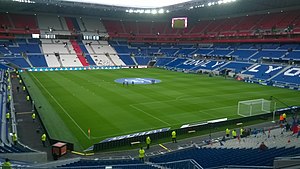Parc Olympique Lyonnais
| Location | 10, Avenue Simone Veil 69150 Décines-Charpieu France |
|---|---|
| Coordinates | 45°45′55″N 4°58′55″E / 45.76528°N 4.98194°ECoordinates: 45°45′55″N 4°58′55″E / 45.76528°N 4.98194°E |
| Owner | OL Groupe |
| Operator | OL Groupe |
| Executive suites | 105 |
| Capacity | 59,186 |
| Record attendance | 57,050 (OL vs ASSE, 2 October 2016) |
| Field size | 105 × 68 metres (344 ft × 223 ft) |
| Surface | AirFibr hybrid grass |
| Construction | |
| Broke ground | 22 October 2012 |
| Opened | 9 January 2016 |
| Construction cost | €415 million |
| Architect | Populous |
| Structural engineer | Vinci SA |
| Services engineer | Vinci SA |
| General contractor | Vinci SA |
| Tenants | |
|
Olympique Lyonnais (2016–present) UEFA Euro 2016 2019 FIFA Women's World Cup |
|
The Parc Olympique Lyonnais, nicknamed the Grand Stade and the Stade des Lumières, is a 59,186-seat stadium for French football club Olympique Lyonnais in Décines near Lyon. It replaced its previous stadium, Stade de Gerland, in January 2016.
It is a scheduled venue for the 2019 FIFA Women's World Cup.
On 1 September 2008, Olympique Lyonnais president Jean-Michel Aulas announced plans to create a new 60,000-seat stadium, tentatively called OL Land, to be built on 50 hectares of land located in Décines-Charpieu, a suburb of Lyon. The stadium would also include state-of-the-art sporting facilities, two hotels, a leisure center, and commercial and business offices.
On 13 October 2008, the project was agreed upon by the French government, the General Council of Rhône, the Grand Lyon, SYTRAL, and the municipality of Décines for construction with approximately €180 million of public money being used and between €60–80 million coming from the Urban Community of Lyon. Since the announcement, the project has been hindered due to slow administrative procedures, political interests, and various opposition groups who view the stadium as financially, ecologically, and socially wrong for the taxpayers and community of Décines. The project is proceeding, with an estimate that the stadium will be completed by 2015, with at least part of a season for breaking in before the 2016 Eurogames.
On 22 September 2009, French newspaper L'Équipe reported that OL Land had been selected by the French Football Federation as one of the twelve stadiums to be used in the country's bidding for UEFA Euro 2016. The FFF officially made their selections on 11 November 2009 and the city of Lyon was selected as a site to host matches during the tournament.
...
Wikipedia

